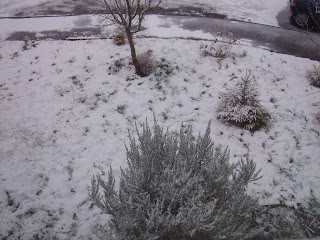Our back garden is where the current bird feeders are, in a corner by a rather rampant shrub. Today, Gavin gave the shrub a severe haircut and the corner was opened up in the first step to it becoming the wildlife corner.
Plans for this corner are:
A hedgehog house
A new bird table and the current hanging feeders
Planting of a carex pendula a kind of sedge, to provide cover for insects and small animals
Large stones and pieces of wood to provide more shelter
Planting of wild flowers attractive to bees and other insects, e.g. borage (which also has edible flowers)
Plants grown from dropped bird seed (last year we had a patch of barley and oats 'planted' by the bird people!)
 |
| New bird table painted today! |
 |
| Frog visiting the pond |
Two bird boxes
Two bird baths
An insect house
A small pond in a wooden barrel planter
A buddleia (butterfly bush)
And other plants attractive to bees and insects such as Hebe and Californian Lilac.
The pond was already here when we moved here. The bird and insect box were inexpensive, £3 each from Morrisons. We've tried to locate them near trees, and the bird box is also in a quiet place where we don't have to walk too much.
Currently we have these visitors (that we know of):
Frogs
House sparrows
Dunnock
Collared doves
Great and Blue tits
Chaffinches
Greenfinches
Blackbirds
Last year there were a lot of bees on the lilac tree which had the most amazing blossom, and we're hoping to see this again. Haven't seen a hedgehog (sadly these are in decline) although the previous owners said one did visit the garden. Hopefully if our garden becomes more wildlife friendly, we'll see more visitors. The wildlife certainly helps. At my previous house on a modern estate with little wildlife, I had a terrible slug and snail problem and had to relocate up to 20 snails a day in Spring! Here, there seems to be a bit more balance and lots of empty shells near stones where the blackbird has been at work.
 |
| The cherry tree |
 |
| Snowdrops |
 |
| First daffodil |
















